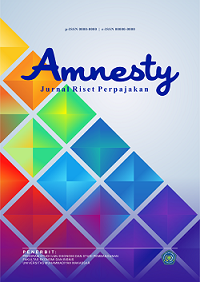Environmental Taxes: Challenges and Opportunities for Sustainable Development
DOI: https://doi.org/10.26618/jrp.v7i2.16460
Environmental taxes, sustainable development, carbon tax, green economy, Indonesia
Abstract
This study explores the role of environmental taxes as a critical instrument for sustainable development, focusing on both the challenges and opportunities presented by their implementation in Indonesia. Environmental taxes, often termed "green taxes," are designed to mitigate environmental degradation by incentivizing industries to adopt eco-friendly practices and reduce their carbon footprint. Although Indonesia has made strides in incorporating environmental taxes through regulations like the carbon tax in Law No. 7 of 2021 and Government Regulation No. 46 of 2017, the application of these policies faces significant hurdles. Key challenges include limited public awareness and understanding of environmental taxes' benefits, as well as concerns over the financial impact on industries. Despite these obstacles, environmental taxes hold substantial potential for environmental enhancement by funding initiatives such as waste management, ecosystem restoration, and the promotion of renewable energy. This research emphasizes the importance of clear communication and collaboration among stakeholders to optimize the effectiveness of environmental tax policies, thereby contributing to Indonesia’s sustainable development goals.
References
Asian-Pacific Economic Literature. (2023). Challenges facing implementation of carbon pricing policies (Vol. 29, Issue 2).
Fernanda, D. S. (2022). Analisis dampak, manfaat, dan realisasi green tax di Indonesia. Prosiding Seminar Nasional Ekonomi dan Perpajakan, 2(1), 85-89.
International Review for Environmental Strategies (IRES). (2023). Environmental protection through green taxes (Vol. 24, No. 1).
Journal of Cleaner Production. (2023). Sustainable development goals achieved via effective use of green taxes (Vol. 278).
Journal of Environmental Science and Health, Part C. (2023). Funding mechanisms for environmental conservation in Indonesia (Vol. 38).
Naimah, I. K., Suwardi, E., & Nasution, V. U. H. N. (2022). Studi penerapan pajak lingkungan: Indonesia, Belanda, Amerika, dan Cina. Environmental Taxes Review.
OECD. (2011). Environmental taxes: A guide to the principles and practice.
OECD. (2020). The impact of carbon pricing on emissions reduction (OECD Environment Working Papers, No. 143).
Pratiwi, R., & Setyawan, A. (2014). Manfaat pajak lingkungan dalam pengelolaan sumber daya alam di Indonesia. Journal of Environmental Science and Health, Part C.
Republic of Indonesia. (2017). PP No. 46/2017 tentang instrumen ekonomi lingkungan hidup.
Republic of Indonesia. (2021). UU No. 7 tahun 2021 tentang harmonisasi peraturan perpajakan.
Setiadi, A., & Kusuma, N. R. (2020). Tinjauan kebijakan pajak lingkungan untuk mewujudkan program ekonomi hijau di Indonesia. Cendekia Jaya, 5(2), 57-65. https://doi.org/10.47685/cendekia-jaya.v5i2.481
Sustainability. (2023). Global climate change mitigation efforts through fiscal instruments (Vol. 15, Issue 12).
Wahyuningsih, et al. (2021). Tinjauan kritis diskursus penerapan green tax dalam konteks perlindungan lingkungan hidup di Indonesia.
World Bank Group. (2020). Green taxation and sustainable development




